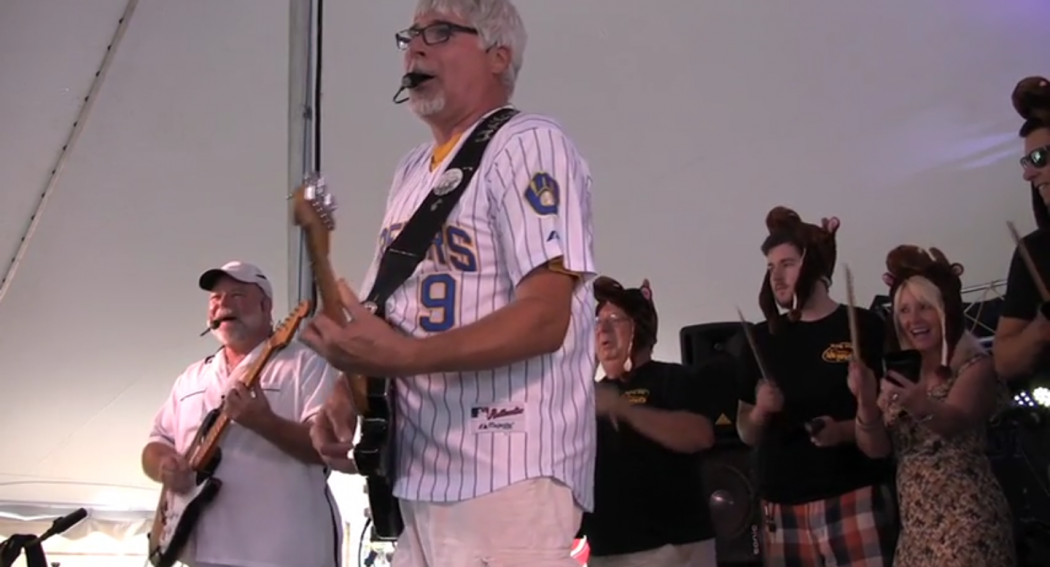“John and I were actually kicked out of one very well-known festival. We thought we had the proper clearance but security wasn’t told and we were escorted out. Needless to say, that parish festival isn’t in the movie.”
Even from their origins in Milwaukee’s Third Ward neighborhood, church festivals have held a specific but strong interest in Wisconsin. Held by and for their respective parishes, the late-spring-through summer events offer live music, games and of course, beer for those looking for an afternoon of dancing and fried food, affectionately dubbed as “asphalt cuisine” and “blacktop gourmet” by festival-goers.
Director Ron Faiola explores the history and textures of the Milwaukee church festival circuit in his 2016 Wisconsin’s Own selection, Tilt-A-Whirls, Cowbells, and Beer. A beer-battered survey of business management and midwestern culture, Faiola’s documentary focuses on the people: subject matter experts who wax philosophical on everything from which churches put out the best fish fry to the experiential enlightenment of amusement park rides. Peppered with thick Upper North accents, polka music, West Milwaukee landmarks, and “Drink For Jesus” t-shirts, Tilt-A-Whirls culminates with twin narratives: Saint Veronica’s 55th and final celebration and the resurrection of Saint Matthias’ once-defunct festival.
But Tilt-A-Whirls is also another step in Faiola’s continued interest in Wisconsin sub-cultures. For our “5 Questions” series, I talked to the director of Wisconsin Supper Clubs and Fish Fry Night Milwaukee about this glorious, and occasionally incongruous, mash-up of faith and fun:
1. I’m remembering your past projects (Fish Fry Night, Wisconsin’s Supper Clubs) and wondering about your fascination with these social scenes in Wisconsin.
My fascination with social scenes in Wisconsin seem to always involve food. I enjoy the traditions we have here – Friday fish fry, Saturday Supper Club prime rib dinners and the “asphalt cuisine” at local festivals. People have some great stories and I just want to document those stories as they relate to our food culture.
2. This whole sub-culture is fascinating as you depict it: the gentlemen who tracks which bands he’s heard; the amount of beer turnover; the strong opinions on cod-frying. Was this borne out of any personal experiences with church festivals?
I’ve been going to church festivals since I was young and attending Catholic grade school. In my twenties, I would attend church (and other) festivals for the games, beer, and entertainment. They’re laid back, there’s no admission charge, and they’re fun. As it turned out, Tilt-A-Whirls co-producer John Prudlow came to me with the idea of documenting church festivals in 2013. It was something he was interested in but needed someone with my experience to help make it happen. We started filming the first festival in May of 2014 and let the documentary take its course over the summer.
3. Is there a particular reason you start with the Council of Festival Committees and organizers of these festivals rather than the festival-goers themselves?
The CFC doesn’t organize the festivals. They hold their annual vendor fair in January where the festival organizers, who are members of CFC, show up and arrange for all the things they need for their festival: rides, games, food, bands, tents, and even porta-pottys. It was a good starting point to explain how well-run the Milwaukee festival market is because of CFC. Not all cities around the country have that type of organization and it makes a big difference in the quality and consistency of the festivals.
4. There’s a brief comment on the dwindling attendance “in the pews,” but from watching Tilt-A-Whirls, I don’t get the sense that these festivals are tied to faith in any specific, substantive way beyond overhead and sponsorship. As both a filmmaker and someone who frequents these events, do you see younger generations’ move away from the church as having had an effect?
I didn’t really get the impression that it was the younger generations that were leaving so much as it was that the older generations (that have more time to volunteer) were fading away. As far as being tied to faith, that seems to be the purpose of the festivals: to invite not just parishioners but the neighborhood to join them for their festival. They do have Sunday services which precede the traditional chicken dinner. As was shown in the movie, some of those masses are Polka-themed.
5. To that point, you do end on a hopeful note for the future of church festivals. Do you think these events will continue or even grow, in the Milwaukee area or otherwise?
One of the more recent budget items we didn’t get into was security. Some of the festivals have become so popular that they’ve had to hire large security teams to work the gates and patrol the grounds, which is safer for the fest goers but is just one more cost to cover. John and I were actually kicked out of one very well-known festival. We thought we had the proper clearance but security wasn’t told and we were escorted out. Needless to say, that parish festival isn’t in the movie.
[Church festivals] will continue as long as they can cope with the permits and regulations that keep changing. Trying to find volunteers is one thing, but having the city cut your tent sizes in half and insurance rates that become too prohibitive are the real unknown challenges in the future. As [is mentioned] at the end, as long as people still want to have them, they’ll continue but maybe as smaller versions of what they used to be.- Tilt-A-Whirls, Cowbells, and Beer plays as part of the “Cowbells and Cowboys: American Snapshots” program on Sat, Apr 16 at 9:00p in the Madison Museum of Contemporary Art.

